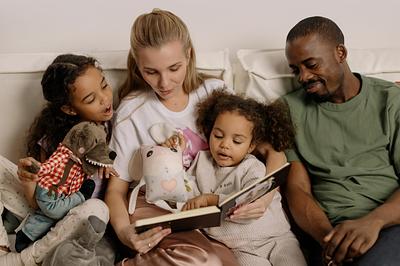Looking for all Articles by Catherine Wilson Garry?
World Book Day and beyond: reading together all year round

World Book Day is an exciting annual celebration of books and reading – however, the benefits of reading, whether relaxing, bonding or having fun, can be enjoyed all year round. This article will talk you through how to embed reading time all year round for all ages: from baby bump to teens!
Babies and toddlers
Reading with children can start even before they are born! The benefits of reading whilst still pregnant include bonding and language development. Our article on reading to your bump will help you get started with when, where and how to get started.
Once your baby is born, regular opportunities to read as part of your routine will help babies feel more familiar with books and help them associate them with relaxation and family time. For babies and young children, reading before bedtime has been shown to help with sleep(this link will open in a new window).
As children grow, putting them in charge of their reading can be a great way to help them see reading as part of their identity. Offer your child three books and ask them to pick which order you read them in. Find more tips in our article on sharing books with babies and young children.

Lower primary
As children start learning to read, explore letting them 'tell' you the story. Even if they can’t read all the words, this offers a more playful way to explore books together that isn’t about getting it “right”. If you have children who are different ages, you can also ask your older child to help you read to their younger sibling(s). This can be a fun way to revisit old favourites, as well as balancing time between reading with each child.
Explore different formats: why not listen to an audiobook when you’re in the car or whilst doing some crafts together? If you’re not sure what books to try, your local librarian is a great source of knowledge. We also have articles on the Scottish Book Trust website about choosing books as well as some of our favourite magazines, comics and audiobooks.
Making reading something playful is a great way to keep it exciting and fresh. Our article of top tips for parents sharing picture books at home contains advice for bringing a story to life including exploring the pictures together, playing with voice, rhythm and speed, and adding actions. Even if you feel nervous or embarrassed by being silly, remember you’re not only making reading more engaging and exciting, but you’re also creating lifelong memories.
Upper primary
At some point, your child may want to read more independently, but this doesn’t have to mean an end to reading together. As your child reads, sit with them and read your own book or magazine. Make time to ask them about what they’re reading – why do they like it? Are there any other books by the same author they might like to read? Make it more special by going on a reading picnic or building a reading den.
If your child is a reluctant reader, seek out books that tie into their favourite things: hobbies, films, music, sports, or video games. Most importantly: let them read what they want to read! They are the experts in what they like and creating an environment where they have freedom to explore is much more likely to make them want to read. For more tips, see our article on engaging reluctant readers.
Secondary

Even if you no longer read to your teenager, why not explore reading the same book? Take it in turns to read or listen to a chapter, checking in with each other once you’ve both caught up. If you’re not sure where to get started, our Teen book discussion guides contains some of our favourite books from Scotland and includes discussion questions you can use to shape any chats you have together. Make it a special event by having your book chat at a café, going for a walk or having snacks and hot chocolate.
You can also still attend events together, such as any activities at your local library, readings at bookshops or festivals, or any local book groups. Even if they want to attend these with friends, making time to chat about what they have, or haven’t, enjoyed as well as talking about your own likes (and dislikes!) as a reader can keep you connected over reading. If your teenager is a reluctant reader, our article on supporting teenagers to read for pleasure outlines some of the ways you can make books more relevant to them.
Next steps
If you’re not sure where to begin, start by making some time to talk to your child(ren). Talk to them about what, when and where they like to read is a great way to start the conversation.
Further ideas:
- See our book lists of what to read next! We've picked suggestions based upon the World Book Day £1 titles for beginning and early readers and fluent and independent readers.
- Find your local library via the MyGov.Scot website(this link will open in a new window)
- Explore our book lists to see if anything sparks your (or your child’s!) interest
- Visit our Home Activity Hub for more support on reading together at home